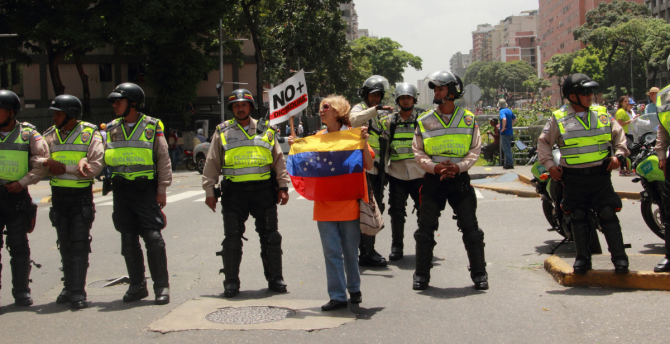
The headlines paint a grim picture of Venezuela. Rule of law is virtually absent; private businesses are routinely seized; hyperinflation cripples everyday commerce; and so many people are fleeing the country that it has created Latin America’s largest exodus ever. But there are a pair of Atlas Network partners still standing for Venezuela’s freedom in the face of seemingly insurmountable odds. We asked Rocío Guijarro, director of the think tank Centro de Divulgación del Conocimiento Económico para la Libertad (CEDICE), and Rafael Acevedo, founder and director of the think tank Econintech, for their perspectives (Original piece appeared in the Fall 2018 issue of Freedom's Champion).
Rocío Guijarro:
Socialism has been the official regime in Venezuela since 1999. Hugo Chávez, a former organizer of a failed coup in 1992, was elected through democratic elections in 1998. And it’s important to note that he didn’t campaign on a platform to set up a political regime of this kind. In his campaign he was essentially a newcomer, who many people thought would fight corruption and clientelism—the broad culture of trading of favors for advantage—of traditional political parties.
Fast-forward nearly two decades and Venezuela now has a socialist regime with military rule, “Cubanism,” price and exchange rate controls, inefficiency, corruption, hyperinflation and scarcity, over-dependence on oil industry, and the cult of Chávez.

Socialism distrusts the individual and its overall concept of man is quite poor. It considers personal initiative as destructive, and freedom is considered socially dangerous. The policy under socialism is homogeneity whereas the motivating forces of competition, creativity, and profit are considered as sources of social unrest. A single explanation of history and society is the great wish of the socialist government. It prefers to have servants instead of citizens.
In practice, the socialist government has built a society of rent-seekers and beggars. The government takes control of the economy, and gives subsidies and aid to the ones that are loyal. It’s a brutal system, a concentration camp where individuals must obey and follow instructions.
An example is the conditioning of social aid and subsidies to those affiliated with the political party of the government. To get food and medicine, citizens must get a card, the “Patriotic Card” (in Spanish, “Carnet de la Patria”). Getting this card demands submission to the political order. “Beggars are not choosers” is the message. If you want to eat, you must obey.
Socialism hurts its citizens acutely.
It undermines personal value because it thinks only in collective terms. Trust in other individuals is abandoned for trust in the leader, whose will everyone must accept. If someone doesn’t choose to emigrate, obedience and acceptance are the only way to survive.
Under socialism property is systematically destroyed. Inflation, sanctions, repression, and volatility erode the net worth of families and enterprises. There’s no way to manage risk and protect property under the economic mismanagement of this system.
Access to foreign goods and technologies is restricted. There is censorship. And people struggling to survive see their capabilities to think, reflect, and create diminished by the immediate needs of food, shelter, and basic staples that are scarce and difficult to get.
It’s not easy, but we at CEDICE try to offer a counter voice to socialist ideology.
We keep track of the attacks on property rights and on the private sector. We collect the statistics about the sanctions and closures of business after government decrees and interventions to regulate prices, fine business, and confiscate their assets. Companies like Heinz, Cargill, Mattel, Kellogg’s, and so many more, have faced some kind or another assault to their property rights. And these assaults don’t just happen to multinational corporations, they happen to hundreds of local, independent companies too. We’ve dedicated much of our work lately to investigating, analyzing, and advocating on behalf of the rights of entrepreneurs. Our project, “Por un País de Propietarios” (For a Country of [Property] Owners), has a website that provides resources for people to report property violations.
We also try to keep an active presence in the media. When possible, we take part in public debates, publications and programs, including Internet resources and newsletters. We also provide educational courses and resources for journalists that promote the dissemination of free-market ideas and practices. Many journalists rely on us for our tracking and analysis of the overall Venezuelan economy. Our Economic Freedom Audit of Fraser Institute’s Economic Freedom of the World Index in 2016 was one of our research milestones.
We’ve been working in Venezuela promoting free market ideas and research since 1984. We know that there’s a lot left to be done, and we’re not giving up anytime soon.
Rafael Acevedo:
One of socialism’s biggest victories in Venezuela is that it has created a great bias against freedom, at both the social and individual level. That’s why we at Econintech want to tackle this problem at the root. And for us that means educating a new generation about the concept of economic freedom. Our new project “Venezuela’s Entrepreneurs” focuses on educating people from some of the poorest sectors of the country. They are educated in management practices, business plans, finance, presentation skills, and other fields in order to give them the tools to succeed in their start-ups. This sort of entrepreneurial coaching is essential to break the bias against natural freedom.
Also, in 2018 we published our first book Causes of Venezuela’s economic disaster: A tribute to Hugo Faria (Causas y Causantes del desastre economico de Venezuela un homenaje a Hugo Faria). The book is a compilation of four of Faria’s essays about Venezuela and notes about Hugo’s work from well recognized free-market professors James Gwartney and Maria Lorca-Susino, among others.